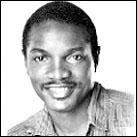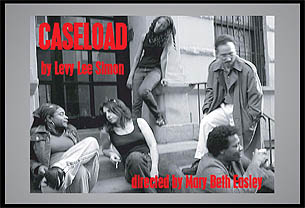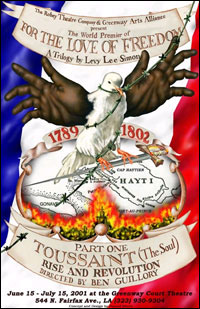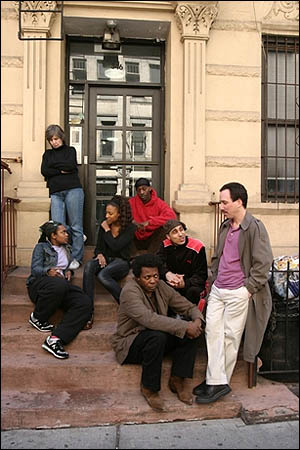Levy Lee Simon, Award Winning Playwright

Originally from Harlem in New York City, award winning actor, screenwriter and playwright, Levy Lee Simon is a graduate of Cheyney State College and the University of Iowa's Playwright's Workshop where he received his MFA in playwriting in 1999. He was a Visiting Professor of Theatre at the University of Iowa from 1999-2001.
Levy Lee is the author of over twenty plays which have been produced and read in theatres around the country. He is the author of the For the Love of Freedom trilogy co-produced by Danny Glover's Robey Theatre and the Greenway Arts Alliance in Los Angeles. Part III in the trilogy, Christophe - the Spirit - Passion and Glory was recently nominated for six 2006 NAACP Awards including a nomination for 'Best Playwright.' Part II, Dessalines - the Heart - Blood and Liberation garnered Levy Lee an Ovation Award nomination for 'Best New Play,' of 2003. Part I, Toussaint - the Soul - Rise and Revolution was nominated for ten NAACP Awards in 2001 including a nomination for "Best Playwright.' All three plays were directed by Ben Guillory Co-Artistic Director of the Robey Theatre. Levy Lee's play, The Bow-Wow Club is the winner of the 1998/9 Lorraine Hansberry Award for, 'Best Full Length Play' awarded by ACTF and the Kennedy Center. His play CASELOAD opened this month and will run through May 20th, 2006 at the Workshop Theatre. Another of his plays, The Smoke King about the life of WEB Dubois, will tour colleges and theatres in the fall of 2006 featuring actor Charles Holt as WEB Dubois. Other notable plays and works in progress by Simon include, Same Train, The Guest at Central Park West, Letters from the Pen, The Real Roxanne, Wolves Over Hollywood, The Drama That Was Us, The Trial of Superfly, and more.
As a screenwriter Levy Lee's adaptation of The Bow-Wow Club, was optioned by FOX Searchlight and Forest Whitaker's Spirit Dance production company.
Among his many acting roles, he was a cast member in the Pulitzer Prize winning, Tony Nominated Broadway production of The Kentucky Cycle and played Caleb Humphries in David Feldshuh's Miss Evers' Boys, at Santa Fe Stages, the Barbican Theatre, and The Bristol Old Vic in England.
Levy Lee Simon and I met for a cup of morning coffee. We sat face to face and I listened intently as he talked frankly about his life as a Black American Playwright, intent on making a meaningful mark. Levy Lee chooses to write about subjects that he feels are important, as evidenced in his For the Love of Freedom Trilogy which deals with Haitian revolutionaries, Toussaint, Dessaline and Christophe “them bad brothers” as he calls them.
His brilliance is humbling. His seriousness and laser-beam-artist-intensity, softened by a calculated and charming sense of humor, caused the time we spent together to fly.
DR: Tell me about your life and your work.
LLS: Well, I was born and raised in Harlem USA. I don't take any step or any breath lightly because most of the people that I grew up with are dead or in jail, strung out or somehow not very successful. Everyday I walk I feel that I am a blessed individual.
I grew up with both of my parents in the household. My mother was a very accomplished woman. She was one of the founders of this country's Head Start program. My father always worked...An African-American Black kid that grows up in the ghetto; you know in "the hood", growing up, you've got to DEAL! I walked that thin line for most of my childhood - that line between being a sweet kid trying to do the straight and narrow thing or a thug. It worked out for me because, in addition to my parents of course, I had so many I had other people in my life that were very positive and supportive, like my football coach. I had people that recognized that there was "something about me". I always heard that. So, I guess that kind of tipped the scale.
I went to Cheyney State College -
The oldest Black Institution in America, founded in 1837, by Quakers, for run away slaves.
(Laughing).
Anyway, when I was in college I discovered acting. Acting always was kind of nipping at my heels. Every time my mother would take me to a Broadway show, my stomach would start doing funny things. Eventually when I got away from the neighborhood and the peer pressure and the pressure of trying to be an artist, I could actually take the plunge for myself. I discovered acting when I was a sophomore and I LOVED IT! I didn't know that I was going to pursue it as a career until I graduated and I came back to the city and worked with Gertrude Jeanette. Gertrude Jeanette is the founder of The Hadley Players, and one of my mentors. Back then, there was a lot of Black theater going on around town, especially uptown. I got the opportunity to work and be trained by some incredible actors there. No one would know their names because they came up in the forties and fifties when the opportunities were not like they are today. I mean these people were stellar performers - Gertrude Jeanette, who was Paul Robeson's best friend. She was black listed along with him, Minnie Gentry, Roger Furman...Just a whole list and I got my foundation in acting there.
Everyone's dream back then was to be a member of The Negro Ensemble Company. Douglas Turner Ward would have these auditions and the lines would be around the corner three times. I had auditioned a couple of years in a row and didn't get a call back or anything. At that time I was working for The Bureau of Child Welfare in the Bronx and one day I get a phone call from The Negro Ensemble Company. They asked if I was ready to go on tour and I said
"What!"
DR: Am I ready?
LLS: Am I ready!?"
Shoot!
On that tour, Ceremonies in Dark Old Men, we did nine months and I haven't worked a regular job since! (Laughs)
Eventually I started writing, but I always wrote, even as a kid. I wrote a play and I finally shared with some of my friends because I kind of wrote in the closet, and they thought that it was pretty good. They suggested that I submit it for a reading. I did and got a reading. I kind of put it on the shelf and wrote another play when I became a member of The Circle Repertory Theater Company. They produced a workshop production and that indirectly led to me getting a fellowship to the University of Iowa for my graduate study in playwriting.
Me going to Iowa? A kid from Harlem going to Iowa?
I'd like to think that by that time I had refined myself but -
DR: We're still talkin' Iowa...

LEVY LEE SIMON'S
"CASELOAD"
Wednesdays through Saturdays at 8:00 p.m.
April 28th through May 20th
Opens Monday May 1st.
The WORKSHOP THEATER COMPANY
The WORKSHOP THEATER COMPANY, Executive Director RILEY JONES-COHEN and Co-Artistic Directors ELYSA MARDEN and TIMOTHY SCOTT HARRIS and are pleased to announce the final production in its 2005-2006 Main Stage season. LEVY LEE SIMON'S CASELOAD, will directed by MARY BETH EASLEY with music and lyrics by MARK BRUCKNER. through May 20th.
Set in the cold sterile halls of a treatment center somewhere outside New York City, "CASELOAD" follows eight patients from all walks of life who share one common goal: to pull themselves out of their various addictions.
Tickets are $18.00 for general admission and $12.00 with current student ID. TDF accepted. For reservations please call 212-695-4173 or visit TheaterMania.com to purchase tickets online.
The WORKSHOP THEATER |312 West 36th Street, on the Fourth floor
(Between Eighth and Ninth Avenues)
LLS: It's still Iowa and me going there with a certain kind of an edge...but it was one of the best moves that I made in my life.
DR: Because?
LLS: I learned a lot.
By that time as an actor, I had been on Broadway and traveled all over the country as an actor and so they didn't treat me like a student. They treated me as a professional who was coming to add more to the arsenal. I felt good about that. That is the way that it was for the most part but racism did raise its ugly head and I had to deal with that in Iowa.
I was out there for five years - three years in grad school and I taught out there for two years. The racism wasn't always overt, but the subtle kind of racism that we deal with. I am not the type that runs away from controversy. I confront. It developed a kind of love/hate relationship that benefited me in the long run. I saw the opportunity there which I could have run a way from but, it was to my benefit to stay and to learn from all of those experiences. Even the bad experiences I learned from.
When I first got to Iowa, there was not one person of color in the graduate acting program and this was 1996. I fought, stood on the tables, yelled and screamed and the next year, of the 16 new graduate actors, they brought in 9 people of color and we rocked and rolled from that point on! Ya know?! We had a bond and we had a great time. I have been told that the University had not seen that kind of diversity and that kind of work, that came from the diversity - EVER! They had to embrace people of color and it gave the work a kind of richness that they couldn't get if it remained all White.
I left Iowa in 2001 and went out to Los Angeles because I was fortunate enough to have optioned a screen play - The Bow Wow club which had won a Lorraine Hansberry Award for best play of the year. I went out there hoping for the "pie-in-the-sky" and then I had to deal with the whole Hollywood challenge which was baptism by fire (Laughing). And I am still there. It has been a struggle but what is life without struggle.
DR: What is life without struggle?
LLS: Well, like I said -
I grew up in Harlem and people ask me all of the time how I feel about that. I would not trade it for the world. The life lessens that I got as a kid, learning how to deal with all different kinds of things and learning how to survive, how to struggle and survive...
One of the things that happened when I went to Iowa was that I realized for the first time in my life, what America was all about. Being in, what I called "the real belly of the beast" in the Mid-west, in the heartland, I saw what privilege was. I had never experienced that kind of privilege. On one level it makes you understand what certain "red state" Americans are fighting for - to keep that privilege! But on another level it is very ugly because it is not inclusive. In order for them to keep that privilege they have to push certain people away.
For me, the struggles are everyday. They come at you from so many different angles. Whether it is just as a Black man in America walking into stores and having to deal with "that', or being out in Hollywood and having to deal with the "kissy-kissy" and the "Lets do Lunch" and then nothing happens for whatever reason. But you just keep going. I don't know any other way. You just keep pushing forward and fighting for what your life's purpose is. I am going to write and write and write and talk about it and write some more and act until the day I die.

Click here for more on Levy Lee Simon's Haitian Revolution Trilogy
DR: And what has been your proudest moment so far?
LLS: Personally, the birth of my daughter. That is my proudest moment in life. Professionally, I would say being on Broadway as an actor in The Kentucky Cycle was a big deal for me and my family. I am proud of having my trilogy on the Haitian Revolution done out in LA at the Robey Theater with Danny Glover and Ben Guillory and the whole group of people out there that put in 110% to do a trilogy with 35 actors, drummers and dancers to tell the story of the Haitian Revolution -
The only successful revolution in the history of the world!
Violently, with Toussaint and Dessaline and Christophe and them bad brothers who said "No we're not takin' it no more!"
To see that actually come to life on stage has got to be one of my proudest moments as an artist. It was pretty incredible. Pretty incredible. Yeah.
DR: Do you consider yourself successful?
LLS: Yes, definitely.
It's funny because you tell people that you are an actor or you tell people that you are a writer and right away they want to know what movies or what TV shows have you been in. My success is not predicated on that. Not that I don't want that but a long time ago, when I first started out, I decided that as an artist I was committed to growth and I was committed to working with incredible people, other incredible artists who respect me and who I respect. If I can sustain that over a certain period of time then I think I have been successful.
And,
I have done that.
It's funny the saying that "God gives you what you ask for" so I told God "OK, you gave me that. Now I'm asking for all of the money. (Laughs) You can give me that now too."
I have been able to work with some very talented incredible artists, even now with The Stuttering Preacher with Joyce and Woody King. My first acting class was down at The Henry Street Settlement with Woody King! So now, to be there, to have my play there is like - Wow. Yeah. That is successful. Yeah.
DR: Do you ever get disappointed in yourself?
LLS: No, not really.
Disappointed in myself? I guess we all have those moments but not lately. I try not to get down about a lot of things especially on a professional level because as an artist the only thing that I really have control over is my creation. It took me going through a process to learn that. As an actor you never know what they are looking for, really. If I don't get the part I am not overly disappointed like I used to be. I would obsess about it. I don't do that anymore. I think the disappointment comes if I allow myself to have too many expectations especially in other people and those expectations fall short. So to safe-guard against that I try not to have all of these expectations. I just try to do the work and put one foot in front of the other.
DR: Do you consider yourself to be more of a dreamer or a do-er.
LLS: Do-er. Do-er.

The Cast of Caseload
DR: Why?
LLS: Well, maybe it's a combination of both. Maybe you have to dream before you do but most of the things that I have in my life, I have dreamed about doing. Not that everything has been done yet. I do have aspirations and things that I want to accomplish but a lot of the stuff that I set out to do has been done and even more. I didn't anticipate being a writer. I was an actor for a long time and like I said, wrote in the closet. Everything that has come about from the writing has been a gift, but it came as a gift because I was -
doing.
I remember so clearly the year before writing the trilogy I was up in Harlem and I went to the Liberation Bookstore and I ran across this book The Black Triumvirate and I thought "This would make a great play or a movie!" I wasn't writing then so I thought that someone else would "do". When I did start to write I knew that I had inside of me, this story that had to be told. It was just living in me. I knew that I had to put it out there and I "DID" that. It went from a dream that someone would "do", it to me actually doing it.
DR: What would you say to the dreamer who is not doing?
LLS: Do. (laughs)
I don't know. Maybe it's not for everyone to dream. I don't know. Maybe dreamers are to dream and share their dreams so that other people can "DO". The Stuttering Preacher came from a story that someone told me and I said that it would make a great play and they weren't going to write so I said "I am going to write it." Maybe dreamers are to dream but for me it's a combination of both.
DR: What are you dreaming about now?
LLS: I dream about -
Living Lovely! (laughing), without worrying about finances and things like that.
I have confidence that my work will get me there eventually. I have a ton of other works in my head, screenplays and plays and stuff that I want to get out and I am in the process of making all of that happen. It's not that it is bad right now but everyone wants to live lovely.
DR: Nothin' wrong with that...
LLS: Nothin' wrong with that. Right? That's just part of life. Yeah.
DR: What is the biggest contribution that you have made to the world so far?
LLS: Wow.
First my daughter. Then, I have some really good people in my life and I like to think that is because I am a good friend and a good person. On a professional level, I love teaching and I think that the time that I taught has been some of the most rewarding time of my life because there are people out there acting and "doing" because of their interaction with me. I feel very proud of that. And then I guess the body of work that I am putting out there. I am hoping that my work is touching people. Whether it makes them laugh or cry or think or whatever...I think that is what it is all about.
DR: So tell me, a hundred years from now what do you want to be remembered for?
LLS: For being handsome and debonair. (Laughing)
No. No No. I'm only joking.
DR: Well, just so you know, I am going to keep that in...
LLS: For being a true artist in the truest sense of the word. There is this quote by Lorraine Hansberry -
"To be an artist is one of the highest aspirations in life..."
I do think that it is a gift from on High and that I have been blessed with that gift - especially when I am writing. There are a lot of times when I can feel the presence of my Higher Power. It is like I become a channeler and in those moments of creating it's like being a true artist.
At the foundation of who I am is the artist. Artists create and hopefully create work that is moving, innovative and that causes people to think and to make change. That is what it is about. There's a lot wrong in this world and --
Can you imagine a world without artists; without the people that look at the world differently and give the rest of the people a way in, to look at the world differently and challenge the world? Can you imagine living in a place where artists are censored and murdered and killed and jailed and all of those crazy things?
Artists have a lot of power and I just want to stay true to that always.
DR: So what do you want to be remembered for?
LLS: Like I said, being handsome and debonair.
Thanks Levy Lee!
Caseload
by Levy Lee Simon
Directed by Mary Beth Easley
Eight clients/people from different walks of life attempt to reclaim their lives in the harsh environment of a drug treatment facility, where they are challenged to live or die by two hard-nosed counselors who have seen it all. Within this environment, questions are answered about not only life and death, but also the system that has created both the disease and the cure. This is not a walk in the park, but a real slice of life.
Show Dates April 28, 29
May 1 and May 3, 4, 5, 6
May 10, 11, 12, 13
May 17, 18, 19, 20
All performances at 8pm
Buy Tickets Online at Theatermania.com (212) 352-3101
Or call The WorkShop at (212) 695-4173, extension 5, for reservations.
